|
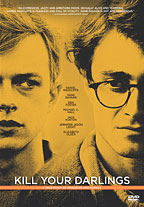
Kill Your Darlings
Killer Films,
2013
Directors:
John Krokidas
Screenplay:
John Krokidas,
Austin Bunn
Starring;
Daniel Radcliff,
Dane DeHaan,
Michael C. Hall,
Jack Huston,
Ben Foster,
David Cross,
Jennifer Jason Leigh,
Elizabeth Olsen,
John Cullum,
Craig Chester
Rated R,
104 minutes |
The Best Minds Of Our Generation
by
Michael D. Klemm
Posted online May, 2014
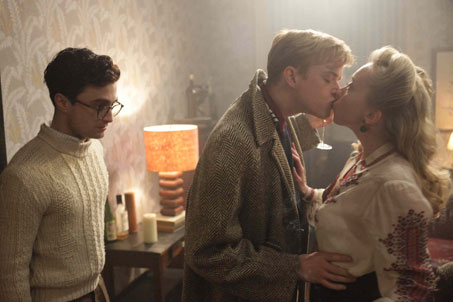
The loves and lusts of the Beat writers are ripe subjects for a juicy motion picture. Kill My Darlings (2013) is the debut film by John Krokidas. Co-written with his college roommate, Austin Bunn, Kill My Darlings dramatizes a crucial episode during the birth of the Beat. The setting is Columbia University and the year is 1943. New freshman Allen Ginsberg (Daniel Radcliff) has just arrived on campus. Excited and uncertain, he is about to meet the young men with whom he will launch a new literary movement - while also coming to terms with being gay. Predictably, Ginsberg and his new buddies will get into a lot of trouble. Their passions run wild, they piss off their professors and one of them commits murder. |
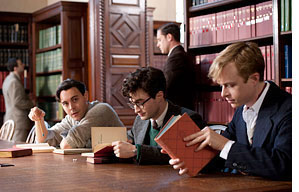 The Three Musketeers of the Beat Generation, Allen Ginsberg, Jack Kerouac and William S. Burroughs make for a merry band onscreen. Here’s a little history to set the scene: Ginsberg will, a decade later, write Howl, a poem that famously pushed a lot of envelopes and a lot of buttons. Kerouac (Jack Huston) is remembered for On The Road (1957), while Burroughs (Ben Foster) is best known for the “cut and paste” fiction of Naked Lunch (1959), the novel he wrote during a long drug binge in Tangiers. The Three Musketeers of the Beat Generation, Allen Ginsberg, Jack Kerouac and William S. Burroughs make for a merry band onscreen. Here’s a little history to set the scene: Ginsberg will, a decade later, write Howl, a poem that famously pushed a lot of envelopes and a lot of buttons. Kerouac (Jack Huston) is remembered for On The Road (1957), while Burroughs (Ben Foster) is best known for the “cut and paste” fiction of Naked Lunch (1959), the novel he wrote during a long drug binge in Tangiers.
|
|
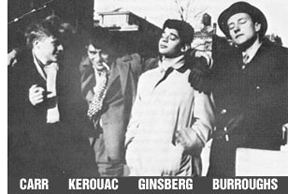 Both Howl and Naked Lunch were banned for being “obscene” and, coincidentally, both authors were openly gay (Burroughs even wrote a book called Queer). The womanizing Kerouac’s sexuality has been widely debated, but writer Gore Vidal relates a drunken night of sex with Jack in his 1995 memoir, Palimpsest. The Beats were literary outlaws during an era marked by Communist witch hunts and television shows like Ozzie and Harriet. They took big bites out of life, inspiring a generation to thumb their noses at authority. Both Howl and Naked Lunch were banned for being “obscene” and, coincidentally, both authors were openly gay (Burroughs even wrote a book called Queer). The womanizing Kerouac’s sexuality has been widely debated, but writer Gore Vidal relates a drunken night of sex with Jack in his 1995 memoir, Palimpsest. The Beats were literary outlaws during an era marked by Communist witch hunts and television shows like Ozzie and Harriet. They took big bites out of life, inspiring a generation to thumb their noses at authority.
|
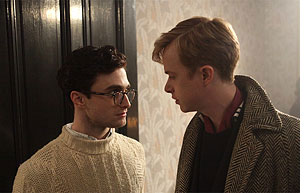 Rounding out the cast, and supplying most of the drama, are two men who are more than just footnotes to the story. Ginsberg has fallen in love with another rebellious student. Lucien Carr (Dane DeHaan) is blonde, seemingly angelic, and a tease who knows how to get what he wants. He is the magnet that brings the three Beat writers together to realize a new artistic vision. He also has a stalker. His name is David Kammerer (Michael C. Hall), a 40-ish gay man whose attentions are becoming unwelcome. “He used to be my guardian angel,” Carr tells a confused Ginsberg, “But then it was too much work.” On August 13, 1944, Carr stabbed Kammerer to death with a boy scout knife, dumped his body in the Hudson River, and claimed self defense. The newspapers called it an “honor slaying,” and he served only18 months in prison. Kerouac and Burroughs were also arrested as material witnesses. Rounding out the cast, and supplying most of the drama, are two men who are more than just footnotes to the story. Ginsberg has fallen in love with another rebellious student. Lucien Carr (Dane DeHaan) is blonde, seemingly angelic, and a tease who knows how to get what he wants. He is the magnet that brings the three Beat writers together to realize a new artistic vision. He also has a stalker. His name is David Kammerer (Michael C. Hall), a 40-ish gay man whose attentions are becoming unwelcome. “He used to be my guardian angel,” Carr tells a confused Ginsberg, “But then it was too much work.” On August 13, 1944, Carr stabbed Kammerer to death with a boy scout knife, dumped his body in the Hudson River, and claimed self defense. The newspapers called it an “honor slaying,” and he served only18 months in prison. Kerouac and Burroughs were also arrested as material witnesses.
|
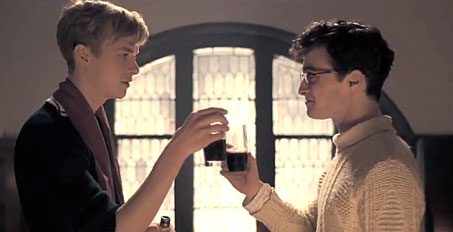 |
Anchoring the film’s jazz and Benzedrine fueled narrative is the “love” triangle between Allen, Lucien and David. Lucien is seemingly straight, but meeting him was all Allen needed to finally know once and for all that he prefers the company of men. He is in love but he’s also jealous and confused by David’s presence. David is obsessed with Lucien; he writes his term papers for him but is usually treated like a doormat in return. Allen slowly learns that all of Lucien’s bold ideas for a “new vision” actually came from David. Lucien finally confesses that David is “a goddamn fruit who won’t let me go.” Look for the pained expression on Allen’s face when he realizes what a “fruit” is. |
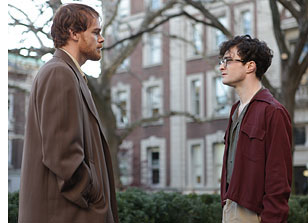 David was once Lucien’s scout master and he has showed up, unwanted, at every school that Lucien has attended over the last five years. David is painted as a sexual predator but it is also hinted that Lucien may have, at least once, reciprocated. Lucien is a narcissist who gets off on everyone’s adoration. He knows how to use people; first David and then Allen. David, seeing Allen as a threat, takes great glee when he tells him that Lucien is out “with a senior football player. A writer. And handsome too.” This is where Kerouac enters the story. Lucien announces that he’s found “a real writer” and Allen initially feels like he’s been thrown over for Jack. David was once Lucien’s scout master and he has showed up, unwanted, at every school that Lucien has attended over the last five years. David is painted as a sexual predator but it is also hinted that Lucien may have, at least once, reciprocated. Lucien is a narcissist who gets off on everyone’s adoration. He knows how to use people; first David and then Allen. David, seeing Allen as a threat, takes great glee when he tells him that Lucien is out “with a senior football player. A writer. And handsome too.” This is where Kerouac enters the story. Lucien announces that he’s found “a real writer” and Allen initially feels like he’s been thrown over for Jack.
|
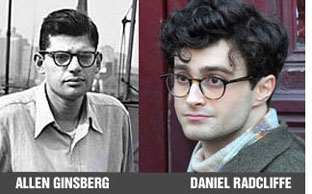 Kill My Darlings can be enjoyed equally by novices and Beat aficionados alike. Those familiar with the actual history will find the attention to detail, and to the facts, admirable. Just like in the film, the recording of a Brahms trio led Allen to Lucien’s dorm room for the first time. The real Kammerer wore a full red beard like the character Hall plays. The scene where Lucien and Allen roll Jack down a hill in a beer barrel is based on an actual event. Ditto for David’s attempt to kill Jack’s cat. But, like Peter Schafer’s Amadeus, scenes are invented, events and characters are combined, and the authors indulge in delightful flights of fancy to make a gripping story even more dramatic and focused. Allen’s role in bringing Lucien and David together on the night of the killing is amplified but it is in keeping with the story we have just watched because he feels betrayed by the man he loves. Kill My Darlings can be enjoyed equally by novices and Beat aficionados alike. Those familiar with the actual history will find the attention to detail, and to the facts, admirable. Just like in the film, the recording of a Brahms trio led Allen to Lucien’s dorm room for the first time. The real Kammerer wore a full red beard like the character Hall plays. The scene where Lucien and Allen roll Jack down a hill in a beer barrel is based on an actual event. Ditto for David’s attempt to kill Jack’s cat. But, like Peter Schafer’s Amadeus, scenes are invented, events and characters are combined, and the authors indulge in delightful flights of fancy to make a gripping story even more dramatic and focused. Allen’s role in bringing Lucien and David together on the night of the killing is amplified but it is in keeping with the story we have just watched because he feels betrayed by the man he loves.
|
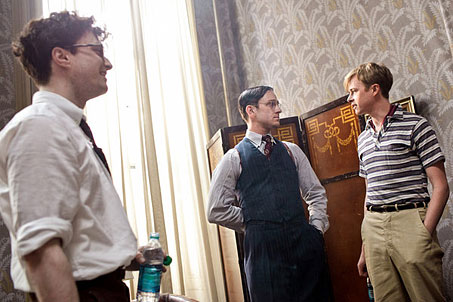 |
Kill Your Darlings is an electrifying film; the camera rarely sits still (just like its subjects) and is always moving. Handheld camera shots alternate with smooth, gliding zooms. There is a pulsating, animated subway map. Popular songs from the period proliferate; the jazz score is loud and its tempo propels the movie’s momentum. We are experiencing the excitement these young writers feel, and the film’s flashy (but not excessive) technique reflects this. There is also a funny and anachronistic use of rock music when they break into the school library to re-arrange some books. |
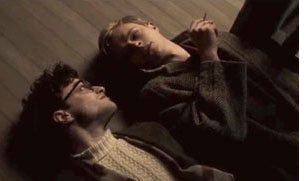 And now to answer the question that I know is on everyone’s minds: do we get to see Harry Potter do it with another man? Does he, at least, share a same sex kiss? The answer is yes and yes. I have to say that I have nothing but respect for Daniel Radcliffe and the choices he's made since the last Harry Potter film. Look at the gutsy roles that he has taken. First he did Equus on stage in London and again on Broadway (and all the press talked about was the nude scene) and now this film. Radcliffe doesn’t go the full monty but look for a very sexy kiss and a sex scene that is surprisingly more explicit than is usual in a film with an R rating. And now to answer the question that I know is on everyone’s minds: do we get to see Harry Potter do it with another man? Does he, at least, share a same sex kiss? The answer is yes and yes. I have to say that I have nothing but respect for Daniel Radcliffe and the choices he's made since the last Harry Potter film. Look at the gutsy roles that he has taken. First he did Equus on stage in London and again on Broadway (and all the press talked about was the nude scene) and now this film. Radcliffe doesn’t go the full monty but look for a very sexy kiss and a sex scene that is surprisingly more explicit than is usual in a film with an R rating.
|
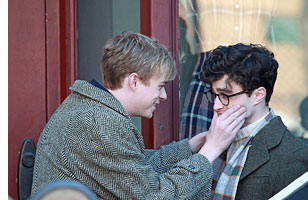 I mention all this at length because it illustrates how the landscape has changed. Twenty years ago, Will Smith refused to kiss a guy in Six Degrees of Separation, and now we are treated to seeing Harry Potter as a bottom. Seriously though, Radcliffe’s performance is amazing. He has natural talent, beautifully portraying both the lovestruck innocent and the jilted lover. (James Franco also played Ginsberg in 2010’s Howl, and they both bring the man vibrantly to life.) Radcliff can be delightfully manic too; watch him smoking and drumming on Burrough’s back in a jazz club, and masturbating while he types their manifesto. I mention all this at length because it illustrates how the landscape has changed. Twenty years ago, Will Smith refused to kiss a guy in Six Degrees of Separation, and now we are treated to seeing Harry Potter as a bottom. Seriously though, Radcliffe’s performance is amazing. He has natural talent, beautifully portraying both the lovestruck innocent and the jilted lover. (James Franco also played Ginsberg in 2010’s Howl, and they both bring the man vibrantly to life.) Radcliff can be delightfully manic too; watch him smoking and drumming on Burrough’s back in a jazz club, and masturbating while he types their manifesto.
|
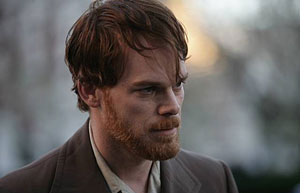 The entire cast is exceptional. Michael C. Hall (Dexter) is both creepy and pathetic as David Kammerer. Aspects of his performance may remind some of his breakthrough role as the (initially) closeted gay son on HBO’s Six Feet Under. Dane DeHaan’s portrayal of Lucien Carr is reminiscent (in a good way) of the many charming cads played by Jude Law over the years. Although I haven’t mentioned this character much, Ben Foster is deliciously deadpan as William S. Burroughs. Jennifer Jason Leigh also has a few unforgettable scenes as Ginsberg’s mentally ill mother. The entire cast is exceptional. Michael C. Hall (Dexter) is both creepy and pathetic as David Kammerer. Aspects of his performance may remind some of his breakthrough role as the (initially) closeted gay son on HBO’s Six Feet Under. Dane DeHaan’s portrayal of Lucien Carr is reminiscent (in a good way) of the many charming cads played by Jude Law over the years. Although I haven’t mentioned this character much, Ben Foster is deliciously deadpan as William S. Burroughs. Jennifer Jason Leigh also has a few unforgettable scenes as Ginsberg’s mentally ill mother.
|
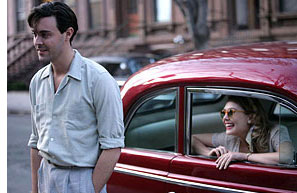 There is so much more that I haven’t even touched on (Kerouac’s girlfriend, Edie, for starters) but, before I wrap things up, I'd like to mention that the film is also an indictment of the era’s homophobia. Nowhere is this more evident, or repugnant, than the very concept of the “honor slaying” (not unlike the notorious “gay panic” defense). There is an scene where Ginsberg, Burroughs and Kammerer watch uncomfortably as a group of “queers” are escorted out of the bar by undercover policemen. When Ginsberg first arrives at Columbia, his roommate sees him looking at Christopher Street on a subway map and tells him that he doesn’t want to go there. (We also get a taste of the era’s anti-Semitism when the roommate inexplicably says “You’re Jewish. I’m getting better at telling.”) There is so much more that I haven’t even touched on (Kerouac’s girlfriend, Edie, for starters) but, before I wrap things up, I'd like to mention that the film is also an indictment of the era’s homophobia. Nowhere is this more evident, or repugnant, than the very concept of the “honor slaying” (not unlike the notorious “gay panic” defense). There is an scene where Ginsberg, Burroughs and Kammerer watch uncomfortably as a group of “queers” are escorted out of the bar by undercover policemen. When Ginsberg first arrives at Columbia, his roommate sees him looking at Christopher Street on a subway map and tells him that he doesn’t want to go there. (We also get a taste of the era’s anti-Semitism when the roommate inexplicably says “You’re Jewish. I’m getting better at telling.”)
|
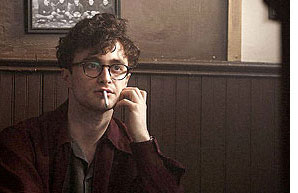 Kerouac’s own treatment of the killing in his final book, Vanity of Dulouz (1968), is often very homophobic but Kill My Darlings places the “love story” front and center. This makes the tale, in some ways, just as hip and dangerous as what the Beats themselves wrote during the 50s. This film was made by people who “get” the subject, and the result is clearly a labor of love. Even the ending is satisfying. I haven’t had this much fun at the movies in awhile. Kill My Darlings is many things but it is not a dry English lesson. Kerouac’s own treatment of the killing in his final book, Vanity of Dulouz (1968), is often very homophobic but Kill My Darlings places the “love story” front and center. This makes the tale, in some ways, just as hip and dangerous as what the Beats themselves wrote during the 50s. This film was made by people who “get” the subject, and the result is clearly a labor of love. Even the ending is satisfying. I haven’t had this much fun at the movies in awhile. Kill My Darlings is many things but it is not a dry English lesson.
More on Allen Ginsberg and the Beats:
Howl
Michael C. Hall also appears in:
Six Feet Under |



